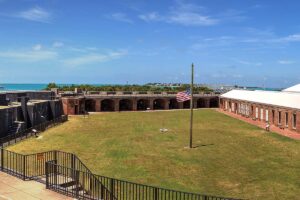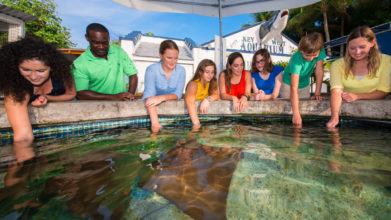Fort Zachary Taylor State Park

Fort Zachary Taylor, designated a National Historic Landmark in 1973, is Florida’s southernmost state park, known equally for its U.S. military history and present-day recreational activities. The state park is located at 601 Howard England Way and is nestled on the edge of Florida’s sun-kissed coastlines offering picturesque views of the Atlantic Ocean.
History of Fort Zachary Taylor

Must-See Areas at Fort Zachary Taylor Park
Fort Zachary Taylor Park, home to Key West coral reefs, opens up a world underwater for snorkelers and scuba divers. The park is a haven for nature lovers with its picturesque trails nestled between the beach and the Civil War fort, perfect for a tranquil picnic. A stroll through the park reveals the preserved Civil War cannons, standing as silent reminders of history. This amalgamation of natural beauty and historical magnificence renders Fort Zachary Taylor Park an indispensable destination for visitors.
Reasons to Visit Fort Zachary Taylor Park

Fort Zachary Taylor Park Visitor Information
For a smooth visit to Fort Zachary Taylor Park, arrive early or bike in to avoid waiting in the parking line. Please note that the park is alcohol-free and requires a modest entry fee, which supports Florida’s state parks. Keep the park pristine by bringing a trash bag for your litter, adhering to the “carry in, carry out” principle. The unique rocky beaches, a product of Key West’s limestone base, may surprise those expecting sandy shores; sturdy waterproof footwear is advised. Remember, the park is open all year round, perfect for festive picnics. By visiting, you’re contributing toward preserving Florida’s historical and natural heritage.
FAQs
How long does it take to visit Fort Zachary Taylor?
Visiting Fort Zachary Taylor can take between two and four hours if you’re touring the historic fort and enjoying the park’s natural beauty. However, if you’re engaging in activities like snorkeling or picnicking, you might need half a day or even a full day to fully experience all the park offers.
Do you have to pay to get into Fort Zachary Taylor?
Yes, there is a small entrance fee for Fort Zachary Taylor Historic State Park. The fees go toward the support and maintenance of Florida’s state parks. It’s worth noting that the park is alcohol-free and operates daily from 9:30 a.m. to 5 p.m., except on major holidays.
Can I tour Fort Zachary Taylor?
Yes, you most certainly can tour the fort at Fort Zachary Taylor Historic State Park. Guided tours are conducted every day from 9:30 a.m. to 5 p.m., except on major holidays. This gives visitors a chance to delve into U.S. military history.
Are there coral reefs to snorkel at Fort Zachary Taylor?
Yes, Fort Zachary Taylor Park is indeed a haven for coral enthusiasts. The park’s unique ecosystem is home to a variety of coral species, including knobby brain, tube, and starlet corals. These beautiful creatures can be seen by snorkelers and divers, offering a breathtaking underwater exploration experience. Please note that touching or disturbing the corals in any way is strictly prohibited to protect these delicate marine organisms.







